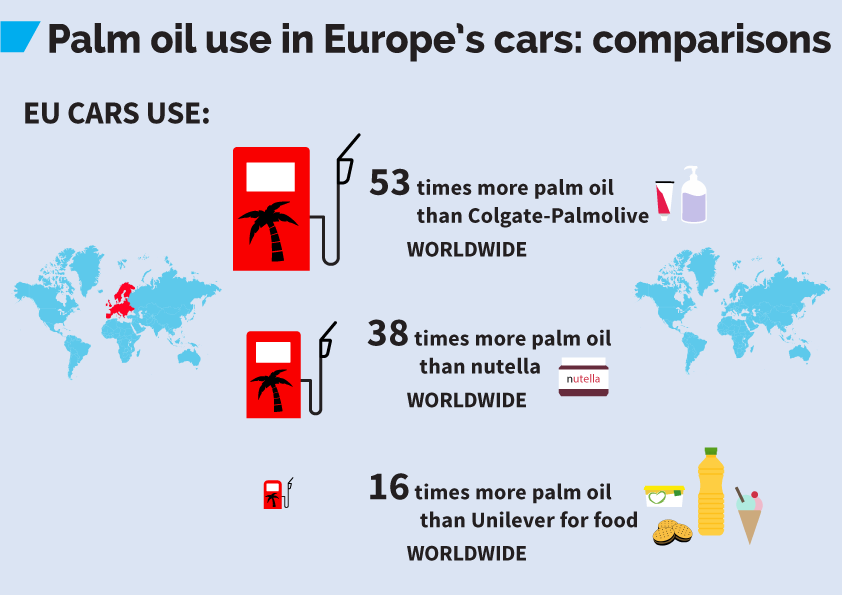
Interested in this kind of news?
Receive them directly in your inbox. Delivered once a week.
Photo: Daniel Beltrá/ Greenpeace
Since the introduction of an EU law to promote biofuels in 2009, palm oil for biofuel has increased five times, from 825,000 tonnes in 2008 to 3.9 million tonnes in 2017, according to OILWORLD, industry reference for vegetable oils markets.
Today, European vehicles burn 38 times more palm oil than Nutella uses globally, and even 16 times more than the world’s largest user of palm oil for food making, Unilever.
Palm oil expansion in Indonesia and Malaysia drives deforestation and peatland drainage, while releasing greenhouse gas emissions and destroying the habitats of endangered species like orangutans. According to the Globiom study for the European Commission, palm oil biodiesel is three times worse for the climate than diesel.
T&E’s clean fuels manager, Laura Buffet, said: ‘Burning palm oil in cars and trucks to meet Europe’s green energy targets must be the single most stupid thing we do in climate policy. The European Commission has to take its responsibility and get behind the European Parliament’s decision to phase out support for palm oil biodiesel.’
The Renewable Energy Directive was introduced to accelerate the uptake of renewables such as solar and wind but its transport chapter has promoted the use of food crops like palm oil, rapeseed oil and soy oil to make biofuels. Biofuels can be counted as zero emissions energy for climate accounting purposes. If biofuels’ overall emissions were properly accounted for, road transport emissions would be 10% higher.
In January, the European Parliament voted to stop counting palm oil biodiesel towards the EU’s green energy targets as of 2021. The decision triggered a well-funded campaign by the palm oil lobby in Malaysia and Indonesia. The European Commission, supported by the previous Spanish and Italian governments, opposes the palm oil phase out. New governments in Spain and Italy opened a window of opportunity. Final negotiations on this law will take place during the energy ministers council meeting on 11 June and the trialogue on 13 June.
Laura Buffet concluded: ‘If biofuels were supposed to reduce emissions, improve energy security and support farmers they are a triple failure. The EU must not waste this once-in-a-decade opportunity to move away from food-based biofuels and start investing in clean renewable electricity and biofuels based on waste and residues.’
Indonesian community leaders support the Parliament decision
Over 200 Indonesian leaders of indigenous communities, farmers’ unions, smallholder organisations, human rights groups and green NGOs have written to Europe’s heads of state and the president of Indonesia stating: ‘We agree with the European Parliament’s proposed change of policy. The EU should ensure that renewable energy is only sourced from businesses that are eco-friendly, equitable and respectful of human rights. Palm oil-based biodiesel clearly does not meet these principles, as shown by the emergence of various social, economic and environmental problems.’


